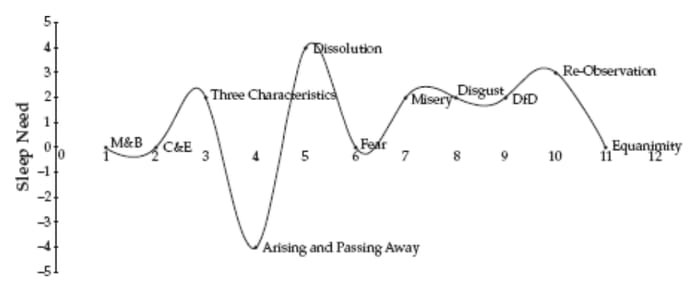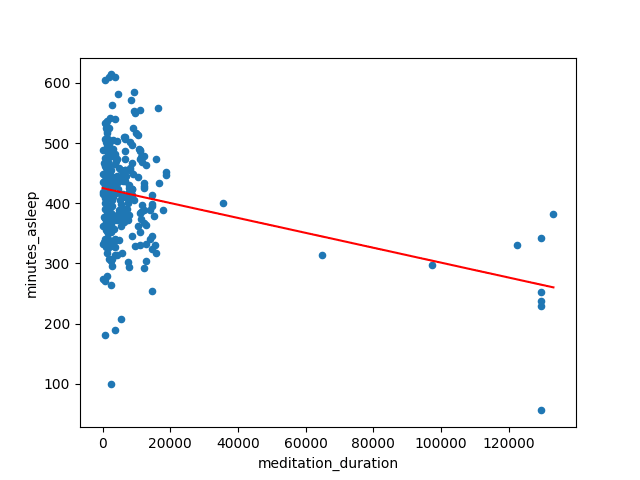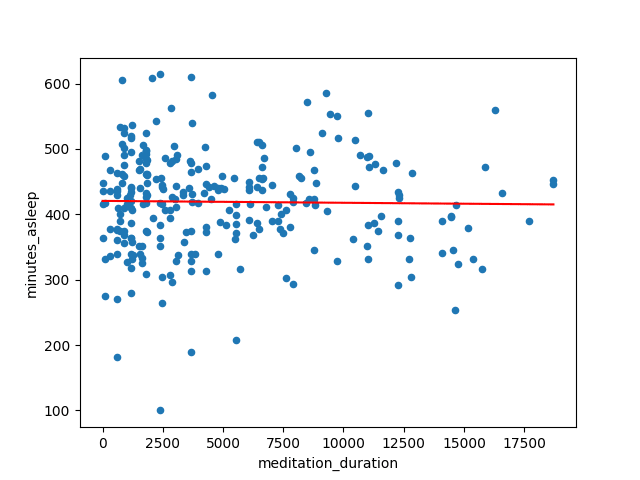Published on April 4, 2025 2:42 PM GMT
Summary: Meditation may decrease sleep need, and large amounts of meditation may decrease sleep need drastically. Correlation between total sleep duration & time spent meditating is -0.32 including my meditation retreat data, -0.016 excluding the meditation retreat.
While it may be true that, when doing intensive practice, the needfor sleep may go down to perhaps four to six hour or less at a time,try to get at least some sleep every night.
—Daniel Ingram, “Mastering the Core Teachings of the Buddha”, p. 179
Meditation in dreams and lucid dreaming is common in this territory[of the Arising and Passing away]. The need for sleep may be greatlyreduced. […] The big difference between the A&P and Equanimity is that thisstage is generally ruled by quick cycles, quickly changing frequenciesof vibrations, odd physical movements, strange breathing patterns, headyraptures, a decreased need for sleep, strong bliss, and a general senseof riding on a spiritual roller coaster with no brakes.
—Daniel Ingram, “Mastering the Core Teachings of the Buddha”, p. 275
Need for sleep tends to increase in the Three Characteristics, mostlydue to how tiring pain can be. Sleep need can drop dramatically in thestage of the A&P, suddenly peak in dissolution, drop a bit again in Fearas our energy returns, and increase during the Dark Night, mostly dueto how mentally fatiguing that stage can be.
—Daniel Ingram, “Mastering the Core Teachings of the Buddha”, p. 379
Note: as far as I know, this chart is not based on any data collected,but on the personal experience of Ingram and his acquaintances.
The interesting thing is that all four of these people within a yearor so of having started this practice claimed to have done it, and by“it” I mean eliminated all emotions entirely, replacing them with aperpetually wonderful perception of the freshness of the sensate world,a lack of time pressure, a reduced need for sleep, and some other benefitsand odd side effects.
—Daniel Ingram, “Mastering the Core Teachings of the Buddha”, p. 462
The sleep models generally relate to either sleeping less or beingawake in some way while asleep. Sleeping less is common during retreats,particularly in some stages such as the A&P. I also know some people who,because of spiritual attainments, have reduced their need for sleep,and this has happened to me at points, but it hasn't been sustained inmy case.
—Daniel Ingram, “Mastering the Core Teachings of the Buddha”, p. 470
Patra & Telles 2009
Patra & Telles2009test the effects of 22½ minutes of "cyclic meditation"(a type of yoga, together with lying in supineposition) on sleep in asample of n=30 men, and find no effect on sleep duration as recorded bya polysomnograph(352.77±41.35 minutes for yoga and 353.03±35.90minutes for supine rest), but more time spent inREM and slow-wavesleep. Participants inthe intervention group rated their sleep as being longer.
I think this study doesn't tell us very much: They use theterm meditation, but are really making their participants doasanas, and I'd guess thatparticipants fall asleep while liying in supine position.
Kaul et al. 2010
Kaul et al.2010find that long-term meditators sleep ~2.5h less at 2.3h meditation/day,which suggests that one can reap the benefits of meditation while alsoincreasing the time spent lucid, if one values time in meditation halfas much as other waking time.
Analysing my Data
After ~1 year of meditation and sleep tracking, I decided to check myown data for patterns. Full code here.
I load the sleep & meditation data from the same timespan:
sleep=pd.DataFrame(sleep_values)first_sleep=sleep['date'].min()last_sleep=sleep['date'].max()meditations=get_meditations()meditations.sort_values(by=['meditation_start'], inplace=True)meditations=meditations.loc[meditations['meditation_start']>(first_sleep-pd.Timedelta('7d'))]sleep.sort_values(by=['start_time'], inplace=True)I then generate the list of days for which to check the subsequent sleepand the preceding meditation:
checkpoints=pd.DataFrame()checkpoints['checkpoint']=pd.date_range(start=first_sleep, end=last_sleep, freq='1d')+pd.Timedelta('18h')For each day at 18:00, I compute the amount of time slept in the next24 hours:
aggregated=pd.merge_asof(sleep, checkpoints, left_on='start_time', right_on='checkpoint', direction='backward')aggregated=aggregated[relevant_sleep_cols+['checkpoint']].groupby('checkpoint').sum()aggregated.reset_index(inplace=True)And add the time meditated:
aggregated=pd.merge(aggregated, meditations, how='cross')aggregated=aggregated.loc[ (aggregated['checkpoint']-aggregated['meditation_end']<pd.Timedelta('4d')) & (aggregated['checkpoint']-aggregated['meditation_end']>pd.Timedelta('0d'))]aggregated=aggregated.groupby('checkpoint').agg({'meditation_duration': 'sum'} | {col: 'min' for col in relevant_sleep_cols})Finally, let's create a dataset without the meditation retreat data:
no_outliers=aggregated.loc[aggregated['meditation_duration']<8*3600]Resulting scatterplots with linear regressions are:
>>> field='minutes_asleep'>>> np.corrcoef(aggregated['meditation_duration'], aggregated[field])array([[ 1. , -0.32231845], [-0.32231845, 1. ]])>>> np.corrcoef(no_outliers['meditation_duration'], no_outliers[field])array([[ 1. , -0.01685158], [-0.01685158, 1. ]])The outlier data is mainly from a single Goenka retreat, which have asleep schedule that almost doesn't overlap with my natural sleep schedule,so there's some significant data contamination here. I still think thatthe reduced sleep at the time didn't have a strong negative effect on me,and my best guess is that that's due to the large amount of meditationI was doing.
Anecdotes
On a 1-month meditation retreat I did I noticed a stark reduction in mysleep time, at ~10 hours of meditation a day I probably slept 5-6 hoursa night (I usually sleep ~8 hours if uninterrupted).
I friend of mine with a long-term chronic illness, also a long-termmeditator, tells me he sleeps ~6-7 hours per night, at around 2 hoursof meditation a day.
Inquiry
If you're a meditator and track your meditation or attend meditation retreats, and have a wearable (like a fitbit, oura ring &c), I'd be highly interested in analyzing your data. More so for intense and/or long meditation retreats.
Discuss




